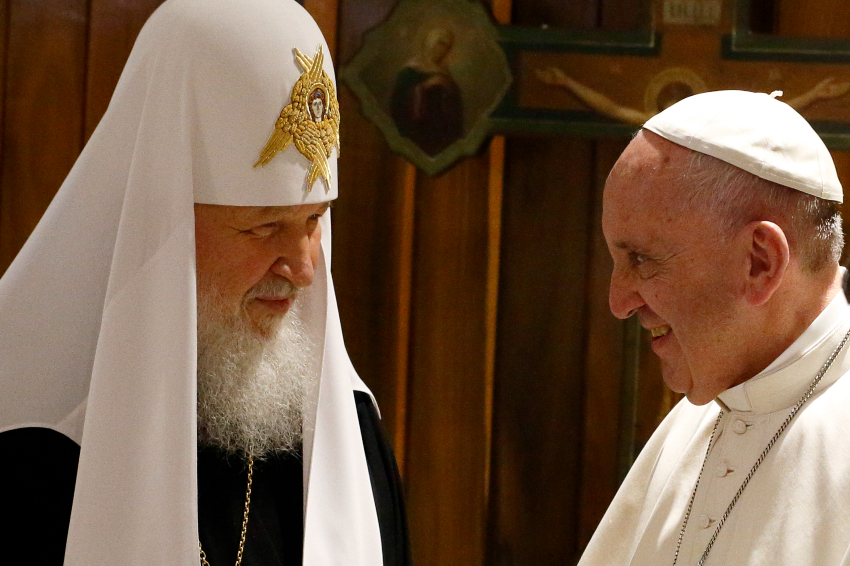
Russian Orthodox Patriarch Kirill of Moscow and Pope Francis met at Jose Marti International Airport in Havana February 12, 2016 — six years ago now. The Pope was traveling to Mexico for a six-day pastoral visit. (CNS photo/Paul Haring)
“It’s difficult to see how Moscow will be part of any future ecumenical dialogue – even how Russian Orthodoxy will hold together… The Eastern window is, for now, closed.” —American Catholic writer Dr. Robert Royal, writing today in his web blog, The Catholic Thing (link). He believes the Russian Orthodox Church’s position on the Ukraine war will bar the Russian Orthodox from participating in dialogue with other Christians to try to overcome centuries of division. This judgment was sparked in part by the sermon delivered by Russian Orthodox Patriarch Kirill on March 6, which has come to be nicknamed “the terrible sermon”
“The Lord, condemning sin, does not condemn the sinner. He only calls him to repentance, but not to ensure that through a sinful person and his behavior, sin becomes a life standard, a variation of human behavior regarded as respected and acceptable. If humanity starts believing that sin is not a violation of God’s law, if humanity agrees that sin is one of the options for human behavior, then human civilization will end there... Therefore, what is happening today in the sphere of international relations has not only political significance. We are talking about something different and much more important than politics. We are talking about human salvation, about where humanity will end up, on which side of God the Savior, who comes into the world as its Judge and Creator, on the right or on the left, we will be.” —Russian Orthodox Patriarch Kirill, in a March 6, 2022 sermon in the Christ the Savior Cathedral of the Russian Orthodox Church in Moscow, three weeks ago now, which has come to be nicknamed the “terrible sermon.” The specific sin Kirill warned against as something being embraced as “respected and acceptable” in the West was homosexuality. Kirill’s sermon aroused outrage throughout the West (see next quote), where it was interpreted as Kirill’s unacceptable defense of the Russian invasion of Ukraine, and the consequent deaths of many civilians, as part of an attempt to defend God’s moral law concerning homosexuality
“Surely, there can be different opinions about the Gay Pride parades, and criticizing these events from a religious point of view is also part of religious liberty. However, using them as a pretext to justify the military aggression of another country and the bombing and killing of thousands of women, men, and children, and doing it as a leader of a large religious body giving a sermon in his cathedral, is—to call it with its proper name—a shame and a scandal. The Russian soccer team has been expelled from the World Cup. Shouldn’t the World Council of Churches and the churches in ecumenical dialogue with the Russian Orthodox Church take some action after this sermon?” —An editorial note about Kirill’s March 6 sermon from the website Bitter Winter, which defends religious liberty worldwide, especially in China. In essence, the note is suggesting that the Russian Orthodox Church should now, after Kirill’s sermon, be expelled from the World Council of Churches
Letter #56, 2022, Monday, March 28: Dialogue over?
Among all the many issues raised by the war in Ukraine, one is the question of the relations between the Catholic Church (which counts more than 1 billion adherents worldwide) and the Russian Orthodox Church (which counts an estimated 100 million adherents, mostly in Russia).
***
Brief background summary
The Russian Orthodox Church was almost eliminated by the Soviet regime, which ruled Russia from 1917 to 1991, for about 74 years.
Thousands of Russian Orthodox churches were dynamited or demolished, and hundreds of bishops and priests arrested and sent to gulags, where they died.
The Russian people were taught by their new leaders that belief in God was a mental deficiency, that the new “Soviet man” had to set religious faith aside and build a “workers’ paradise” in this world, not in the next.
The Soviet regime allowed a limited space for religious believers, and within this narrow space, believers often “collaborated” to a lesser or greater extent with the regime, for (evident) pragmatic reasons.
When the Soviet regime collapsed in 1991 — now more than 30 years ago — the Russian Orthodox Church (as well as other smaller religious groups in Russia) was permitted a greater freedom in Russian society.
Still, because of the seven decades of collaboration, a certain pattern in which the Church was subordinated to the government had become almost customary.
In a partial reflection of this relationship, when the war in Ukraine began on February 24, now more than a month ago, the leader of the Russian Orthodox Church, Patriarch Kirill, did not condemn the Russian “special operation,” but expressed understanding and support for the reasons Russian President Vladimir Putin had set forth as an explanation for his decision.
This was followed two weeks later by a now-famous homily that Kirill delivered on March 6 in Moscow, a homily which has become known as the “terrible sermon.” (A full copy of the sermon is below.)
In this “terrible sermon,” Kirill said that the invasion of Ukraine was part of a “metaphysical” conflict with the West.
***
In Catholic circles, much attention recent days was focused on the Consecration of Russia and Ukraine to the Immaculate Heart of the Virgin Mary by Pope Francis on Friday, March 25, Feast of the Annunciation, in Rome.
However, the world’s major media, as far as I can judge, have given little or no attention to this consecration.
***
In this context, it seems fitting to mention once again the figure of a great Russian Orthodox saint, St. Elizabeth Federovna, who was not Russian at all, but — like her sister Alexandra, who married the last czar of Russia, Nicholas II — a German, and a grand-daughter of Queen Victoria of England. (The sisters spoke English fluently.)
Elizabeth’s husband, Grand Duke Serge, was assassinated by a bomb thrown into his carriage in front of his Moscow home in 1905.
Elizabeth, childless and widowed, then entered religious life, becoming a nun in the Russian Orthodox Church, slowly drawing other women to her new order, taking care of poor and abandoned children.
Elizabeth was arrested after the Bolshevik Revolution in the fall of 1917.
She was brought to the Ural Mountains, and on July 18, 1918, was thrown down an abandoned mineshaft in a little village not far from Ekaterinburg — the place where her sister and the entire family of Nicholas II were executed on July 17, 1918 — and, after three days, died.
The veneration by the Russian people for Elizabeth, this great non-ethnic Russian saint, seems a clear sign of a spiritual universality that may be found within Russian Orthodoxy, so… a sign of hope for us, even as these present tragedies, which cause so much horrific suffering, drive us to our knees with prayers to ask for the miracle — in circumstances that would seem to exclude it — of an end to this war and the return of peace.
For this reason, we hope that the “eastern window” mentioned by Robert Royal at the end of his essay (see below) may yet be kept open, so that the dialogue necessary to prepare any peace agreement may be possible.—RM
Theology and Human Conflicts (link)
Monday, March 28, 2022
Cardinal Manning – a contemporary and follower of Cardinal Newman – once remarked that “All human conflict is ultimately theological.” (You could even say all things human inevitably involve theology, but that’s a complex subject for another day.)
In Russia’s current war against Ukraine, the theology is not an ultimate consideration. It’s near the surface.
Even if the war ends in some tolerable outcome, the theological divisions are going to be with us for a long time.
Because it’s not only Vladimir Putin who has declared Ukraine a “holy war,” but also religious leaders such as Moscow Patriarch Kirill.
Putin is cynically using the Orthodox as moral cover for his ambitions.
But he’s also intuited that to “make Russia great again,” Russian Orthodoxy – the bearer of many deep elements in the myth of Holy Mother Russia and its secular projection, “Russian world” – is crucial to the political plan.
The Russian Orthodox leaders have no such political excuse.
In fact, we now see not only political corruption among compromised Russian religious leaders, but a deep spiritual divide that was somewhat covered over by professions of Christian brotherhood.
There are even Christians in the West who, traumatized by our decadence and woke-ism, have convinced themselves that Putin’s Russia – with its generalized repression, assassination of dissidents (even abroad), and the highest rate of abortion in the world – is somehow a religious savior.
Several recent popes have made serious efforts to heal the schism between Rome and Orthodoxy – and have generally been rebuffed.
Before the war started, Pope Francis was seeking a second meeting with Patriarch Kirill. The first took place in 2016 at the Havana airport.
Agreeing to that pariah venue was bad, but at least both leaders expressed a “deep desire” for unity.
And the pope said of the meeting “We spoke as brothers.”
That fraternal spirit has not lasted.
During their Zoom meeting earlier this month, Francis seems to have boldly chided Kirill, for claiming the Ukrainian “special military action” is “holy war.”
Francis made an even bolder move on Friday with the consecration of Russia, Ukraine, and the whole world to Our Lady of Fatima. Kirill and Putin know that Our Lady asked for that consecration to stop Russia’s errors from spreading and to bring about the nation’s conversion. Kudos to Francis for doing both things, whatever objections may have come his way.
Unfortunately, Francis also contradicted the whole Christian tradition in the meeting with Kirill with the claim that all wars are unjust.
Just this past week, he added while speaking to a coalition of women’s groups, “I was embarrassed when I read that a group of states have committed to spending two percent. . . of GDP in acquiring weapons as a response to what is happening now. Madness.”
And he deplored “the old logic of power that still dominates so-called geopolitics.”
Indeed, it does – and will, so long as fallen human beings continue to exist on earth. Which is why some powers – imperfect, historically and morally – must at times stop the most ruthless among us from dominating the world.
(continued below)
Here, a photo showing Patriarch Kirill walking behind Vladimir Putin
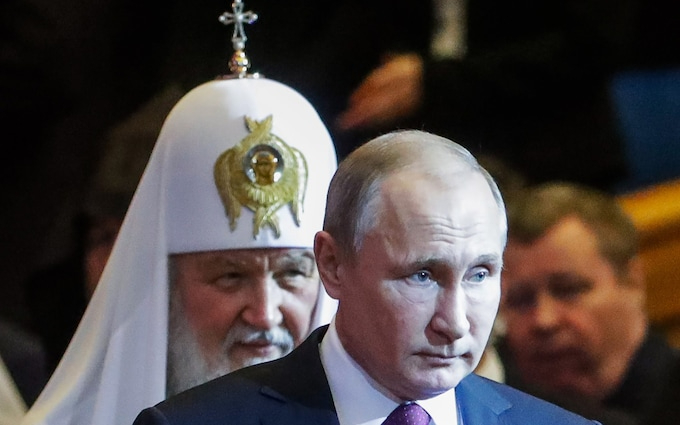
It’s not “madness” when nations decide on defense budgets in light of the threats they face. Given an aggressive Russia, political leaders are merely being responsible in beefing up national defenses, late though it’s coming.
Francis seems to think that “dialogue,” not deterrence, is the only permissible Christian response to threats.
You may appreciate his horror at war without accepting that premise.
Dialogue has not even brought religious agreement with Kirill.
Putin, I’m sure, would love to see dialogue, endless dialogue – in the churches, NATO, American politics – while he moves on one nation after another.
The Ukrainians take a different view. Which is why they’re still standing, and Russia has had to turn to lesser ambitions in Ukraine.
The fall of the Soviet Union opened up some possibilities – for both the churches and Russia.
The Russian Orthodox Church – the largest of Orthodox bodies – was both persecuted and compromised under Communism.
In his collaboration – perhaps even active work – with the KGB, Kirillplayed a shameful role in that unholy compromise.
He’s compromised himself again – alienating most Orthodox in Ukraine in the process by blessing Putin’s slaughters.
Under the circumstances, it’s difficult to see how Moscow will be part of any future ecumenical dialogue – even how Russian Orthodoxy will hold together.
The Great Schism (1054) between the Western Church and the Orthodox is almost a millennium old, and is painful because – filioque questions notwithstanding – it’s more a matter of jurisdictions and governance than doctrine.
Orthodox bishops, priests, sacraments are not only valid in Catholic understanding; the rich spiritual and liturgical traditions of the East contain much that should be integrated into a global and universal Church.
Jesus Himself prayed for an ecclesial unity like His own unity with the Father. Christians haven’t been very good at that high – and admittedly demanding – calling. (Jn. 17:21)
In his 1995 encyclical Ut Unum Sint (“That They All May Be One”), St. John Paul II spoke of the kind of true ecumenism – not the flabby, sentimental version common in Western “ecumenical” discussions – as rooted in the historical reality and spiritual substance of East and West: “The Church must breathe with her two lungs! In the first millennium of the history of Christianity, this expression refers primarily to the relationship between Byzantium and Rome. From the time of the Baptism of Rus’ it comes to have an even wider application: evangelization spread to a much vaster area, so that it now includes the entire Church. If we then consider that the salvific event which took place on the banks of the Dnieper goes back to a time when the Church in the East and the Church in the West were not divided, we understand clearly that the vision of the full communion to be sought is that of unity in legitimate diversity.”
Pope Francis, too, has spoken of unity without uniformity.
His task, going forward, will be to practice what he preaches within the Western Church.
The Eastern window is, for now, closed.
[End, Robert Royal essay]
A Terrible Sermon: Patriarch of Moscow Blesses “Metaphysical” War Against the “World of Gay Prides” (link)
03/07/2022
On March 6, ironically Forgiveness Sunday for the Orthodox, Patriarch Kirill abandoned all caution and blessed the war of aggression against Ukraine and the “false freedom” of democratic countries.
by Bitter Winter
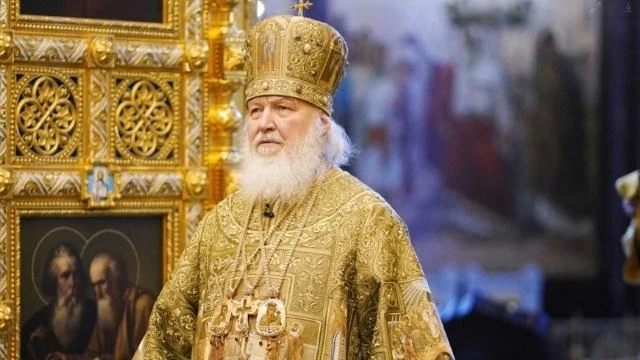
The Patriarch at the Forgiveness Sunday service on March 6, 2022. From Telegram.
Note by the Bitter Winter website: We publish the translation of the integral version of the sermon delivered by Patriarch Kirill of Moscow on March 6, 2022, in the Cathedral of the Holy Savior in Moscow. Our readers may judge for themselves. Surely, there can be different opinions about the Gay Pride parades, and criticizing these events from a religious point of view is also part of religious liberty. However, using them as a pretext to justify the military aggression of another country and the bombing and killing of thousands of women, men, and children, and doing it as a leader of a large religious body giving a sermon in his cathedral, is—to call it with its proper name—a shame and a scandal. The Russian soccer team has been expelled from the World Cup. Shouldn’t the World Council of Churches and the churches in ecumenical dialogue with the Russian Orthodox Church take some action after this sermon? Should not the international pro-family movement itself denounce the manipulation of its values to justify aggression and war?
Forgiveness Sunday Sermon
March 6, 2022
By Russian Orthodox Patriarch Kirill
In the name of the Father and the Son and the Holy Spirit!
I heartily congratulate all of you, my dear authorities, fathers, brothers and sisters, on this Sunday, on Forgiveness Sunday, on the last Sunday before the start of the Holy Forty Days, the Great Lent!
The Great Lent is called by many ascetics the spiritual spring. It coincides with the physical spring and at the same time is perceived by the consciousness of the Church as a spiritual spring. What is spring? Spring is the rebirth of life, it is renewal, it is new strength. We know that it is in the spring that a powerful juice breaks through to a height of ten, twenty, one hundred meters, reviving the trees.
This is truly an amazing miracle of God, a miracle of life. Spring is the rebirth of life; it is a great symbol of life.
And therefore, it is not at all accidental that the main spring holiday is the Easter of the Lord, which is also a sign, a symbol of eternal life.
And we believe that this is so, which means that the entire Christian faith that we share with you is a faith that affirms life, which is against death, against destruction, which affirms the need to follow Divine laws, in order to live, in order not to perish either in this world or in the world to come.
But we know that this spring has been overshadowed by grave events related to the deterioration of the political situation in the Donbass, almost the beginning of hostilities. I would like to say something on this subject.
For eight years there have been attempts to destroy what exists in the Donbass.
And in the Donbass there is rejection, a fundamental rejection of the so-called values that are offered today by those who claim world power.
Today there is a test for the loyalty to this new world order, a kind of pass to that “happy” world, the world of excess consumption, the world of false “freedom.”
Do you know what this test is?
The test is very simple and at the same time terrible—it is the Gay Pride parade.
The demands on many to hold a gay parade are a test of their loyalty to the new world order; and we know that if people or countries reject these demands, then they do not enter into that world order, they become strangers to it.
But we know what this sin is, which is promoted through the so-called Prides.
This is a sin that is condemned by the Word of God, both the Old and the New Testament.
Moreover, the Lord, condemning sin, does not condemn the sinner.
He only calls him to repentance, but not to ensure that through a sinful person and his behavior, sin becomes a life standard, a variation of human behavior regarded as respected and acceptable.
If humanity starts believing that sin is not a violation of God’s law, if humanity agrees that sin is one of the options for human behavior, then human civilization will end there.
And Gay Pride parades are designed to demonstrate that sin is one of the legitimate variations of human behavior.
That is why in order to enter the club of those “free” countries, it is necessary to hold a Gay Pride parade.
Not to make a political statement “we are with you,” not to sign any agreements, but to hold a Gay Pride parade.
And we know how people resist these demands and how this resistance is suppressed by force.
This means that we are talking about imposing by force a sin condemned by God’s law, and therefore, to impose on people by brutal force the denial of God and His truth.
Therefore, what is happening today in the sphere of international relations has not only political significance.
We are talking about something different and much more important than politics.
We are talking about human salvation, about where humanity will end up, on which side of God the Savior, who comes into the world as its Judge and Creator, on the right or on the left, we will be.
Today, out of weakness, stupidity, ignorance, and most often out of unwillingness to resist, many go there, to the left side.
And all that is connected with the justification of sin, condemned by the Bible, is today a test for our faithfulness to the Lord, for our ability to confess faith in our Savior.
Everything that I say has not just some theoretical meaning and not only a spiritual meaning.
Around this topic today there is a real war.
Who is attacking Ukraine today, where the suppression and extermination of people in the Donbass has been going on for eight years?
Eight years of suffering and the whole world is silent: what does that mean?
But we know that our brothers and sisters are really suffering; moreover, they may suffer for their loyalty to our Church.
And so today, on Forgiveness Sunday, on the one hand, as your shepherd, I call on everyone to forgive sins and insults, including where it is very difficult to do this, where people are at war with each other.
But forgiveness without justice is capitulation and weakness.
Therefore, forgiveness must be accompanied by the indispensable preservation of the right to stand on the right side of the world, on the side of God’s truth, on the side of the Divine Commandments, on the side of what the Light of Christ, His Word, His Gospel, His greatest covenants given to the human race, reveal to us.
All of the above indicates that we have entered into a struggle that has not a physical, but a metaphysical significance.
I know how, unfortunately, Orthodox people, believers, choosing the path of least resistance in this war, do not reflect on everything that we are thinking about today, but just follow the path that the powers that be show them.
We do not condemn anyone, we do not invite anyone to come to the cross, we just say to ourselves: we will be faithful to the word of God, we will be faithful to His law, we will be faithful to the law of love and justice, and if we see violations of this law, we will never be tolerant with those who destroy this law, blurring the line between holiness and sin, and even more so with those who promote sin as an example or as one of the models of human behavior.
Today, our brothers in the Donbass, Orthodox people, are undoubtedly suffering, and we cannot but be with them, first of all in prayer.
It is necessary to pray that the Lord would help them to preserve the Orthodox faith, not to succumb to the temptation of this world.
At the same time, we must pray that peace will come as soon as possible, that the blood of our brothers and sisters will stop flowing, that the Lord will incline His mercy to the long-suffering Donbass land, which has been bearing this mournful stamp for eight years, generated by human sin and hatred.
Entering the field of Great Lent, let us try to forgive everyone.
What is forgiveness? If you ask for forgiveness from a person who has broken the law or done something evil and unfair to you, you thereby do not justify his behavior, but simply stop hating this person. He ceases to be your enemy, which means that by your forgiveness you deliver him to the judgment of God. This is the true meaning of forgiving each other our sins and mistakes.
We forgive, we renounce hatred and vindictiveness, but we cannot there, in the face of heaven, accept what is not true; therefore, by our forgiveness, we commit our offenders into the hands of God, so that both God’s judgment and God’s mercy may be administered on them.
So that our Christian attitude towards human sins, delusions and insults will not be the cause of their death, but the just judgment of God would be carried out on everyone, including those who take upon themselves the heaviest responsibility, widening the chasm between brethren, filling it with hatred, malice, and death.
May the merciful Lord execute His righteous judgment on all of us.
And so that as a result of this judgment we do not stand on the left side of the Savior who came into the world, we must repent of our own sins.
Approach your life with a very deep and impartial analysis, ask yourself what is good and what is bad, by no means excusing ourselves by saying, “I had a fight with this or that because they were wrong.”
That is a false argument, that is the wrong approach. We must always ask before God: Lord, what did I do wrong? And if God helps us to realize our own unrighteousness, then repent of that unrighteousness.
It is today, on Forgiveness Sunday, that we must accomplish this feat of self-denial and move away from our own sins and our unrighteousness, the feat of surrendering ourselves into the hands of God; and the most important feat is the forgiveness of those who offended us.
May the Lord help us all to pass through the days of the Holy Forty Days so as to worthily enter into the joy of the Bright Resurrection of Christ.
And let us pray that all those who are fighting today, who are shedding blood, who are suffering, will also enter into this joy of the Resurrection in peace and tranquility.
Because what joy will there be if some are in the world, while others are in the power of evil and in the sorrow of internecine warfare?
May the Lord help us all in this way, and not otherwise, to enter the days of Holy Great Lent, to save our souls and contribute to the multiplication of goodness in our sinful and often terribly misguided world, so that the truth of God may reign and dominate and lead the human race. Amen.
[End, sermon of Patriarch Kirill from March 6]
Ukraine: Orthodox United Against Putin (link)
March 2, 2022
Even the Orthodox Church in communion with the Patriarchate of Moscow called Ukrainians to resistance, comparing the Russian President to Cain.
by Massimo Introvigne
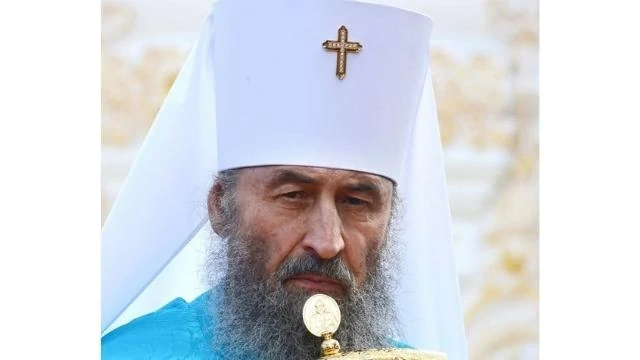
Metropolitan Onuphrius (Onufriy) of Kiev, head of the Ukrainian Orthodox Church of the Moscow Patriarchate, compared Putin to Cain, who hilled his brother Abel. Credits.
There is a religious aspect in the war in Ukraine, and some of its features are surprising and paradoxical.
Others are not.
In his first speech to the nation in which he announced the armed intervention, Putin evoked the link between the “Russian world” and the Orthodox Church led by the Patriarch of Moscow.
He also offered as evidence of Western conspiracies in Ukraine the fact that in 2018 the Ukrainian Orthodox Church broke away from the Moscow Patriarchate and joined the other major world Orthodox jurisdiction, the Ecumenical Patriarchate of Constantinople, which is based in Istanbul, the ancient Constantinople.
Not all Ukrainian Orthodox accepted this decision.
Some remained with the Patriarch of Moscow in the Ukrainian Orthodox Church of the Moscow Patriarchate.
Putin stated that these Ukrainian Orthodox in communion with Moscow are being persecuted by the majority Ukrainian Orthodox Church and the government, and that one of the goals of his troops is to end the persecution.
About sixty percent of Ukrainians adhere to the Ukrainian Orthodox Church in communion with the Ecumenical Patriarch of Constantinople.
A figure variously estimated at fifteen to twenty percent are part of the Church in communion with the Patriarch of Moscow.
It should not be forgotten that there are also Catholics in Ukraine: over four million, a little less than ten percent of the population.
They follow the Greek rite, meaning they have different traditions, canon law, and liturgical practices, but remain in full communion with the Holy See.
There is also a significant minority of Catholics following the Latin rite.
To complete the map of Ukrainian Christians, there are almost ten thousand Protestant communities. There are also over nine hundred Kingdom Halls of the Jehovah’s Witnesses, and the Church of Jesus Christ of Latter-day Saints, popularly known as the Mormon Church, has some forty congregations and one of its temples is in Kiev.
Of some relevance to understanding the war is also the religious situation in Russia.
Here in polls over 60% of the population claims to be part of the Orthodox Church of the Moscow Patriarchate.
However, this figure includes many who are rarely or never active in Church activities, and the Moscow Patriarchate views with concern its loss of influence among the younger generations.
Invited by political authorities or the Patriarchate itself, I was a speaker in several conferences in Russia on the causes of this phenomenon.
My impression is that there are causes common to most European countries, which have been hit by more or less aggressive waves of secularization, and a cause specific to Russia, where many consider the Moscow Patriarchate to look too often like a public relations agency for Putin, a sort of “ministry of religion” of the regime.
Many Orthodox bishops, however, do not accept this analysis, which would require some self-criticism on their part.
They attribute their problems to the aggressive competition of religions and “cults” imported from the West, whose numbers, however, are relatively small and statistically cannot explain the hemorrhage of active members that has hit the Patriarchate.
The more conservative bishops believe that this is part of a diabolical plan of the United States and the European Union to destroy the Orthodox soul of Russia.
They have entered into an even closer alliance with the Putin regime, guaranteeing it unconditional support and receiving in exchange economic help in various official and unofficial forms, and restrictive laws to get rid of competition.
They have led, among other things, to outlaw Jehovah’s Witnesses, who are the victims of a ruthless policy of arrests and violence condemned by all international institutions.
The same Russian Orthodox bishops perceived the move of the majority of Ukrainian Orthodox devotees from the Patriarchate of Moscow to that of Constantinople, which was largely due to the political crisis between Ukraine and Russia following the invasion of Crimea, as a wound caused by the usual American and European conspiracies.
In Putin’s pseudo-republics of Donetsk and Luhansk, i.e. in the areas of Eastern Ukraine controlled by pro-Russian separatists, laws explicitly recognize the national character of the Orthodox Church in communion with the Patriarchate of Moscow, discriminating against the one in communion with the Patriarch of Constantinople and against other Christian and non-Christian communities.
Some academic observers have called Donetsk and Luhansk “Orthodox mini-theocracies.”
It is therefore not surprising that Putin, by invading Ukraine, presented himself as the champion of the Russian Orthodox Church.
He also presented the conflict as a religious war, one of whose objectives is to bring back all Ukrainian Orthodox into the fold of the Moscow Patriarchate.
In recent years, after all, Putin has increasingly resorted to the old Russian rhetoric of Moscow as the “Third Rome,” the only Rome left standing after the fall of ancient Rome (which for Putin’s ideologues is also the moral fall of contemporary Western Christianity) and of Constantinople, thus the only remaining bastion of world Christianity.
Nor is it surprising that the Patriarch of Moscow remained silent for a long time and then made statements that were presented in the West as a call to peace but in Russia and Ukraine were interpreted, perhaps correctly, as expressing an ambiguous position and avoiding any criticism of Putin’s actions.
It is also not surprising that some of the harshest words about this crisis have been spoken against Putin, calling the Ukrainian people to resistance, by Metropolitan Epiphanius, primate of the Ukrainian Orthodox Church in communion with Constantinople, and Patriarch Sviatoslav Shevchuk, head of the Greek Catholic Church, that is, of the vast majority of Ukrainian Catholics.
Patriarch Shevchuk’s statements contrasted with the much more cautious position of the Vatican, which is concerned with not jeopardizing its ecumenical relations with the Patriarch of Moscow, while also keeping those with the Ecumenical Patriarch of Constantinople—which looks like a difficult exercise.
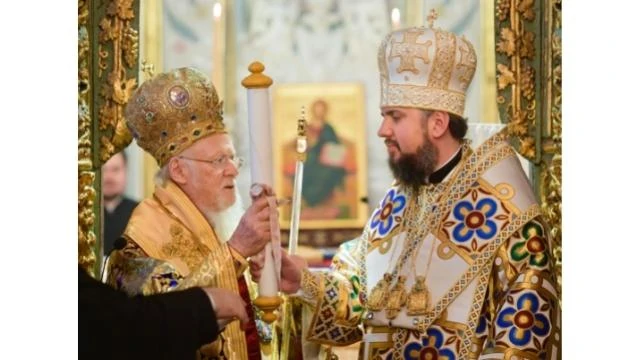
Ecumenical Patriarch Bartolomew of Constantinople (left) with Metropolitan Epiphany (right). Credits.
But there is something surprising.
Very surprising indeed.
It is the fact that the Ukrainian Orthodox Church of the Moscow Patriarchate, i.e., according to Putin, the very Church that Russian troops went to defend in Ukraine against the “persecution” of the majority Orthodox Church and the government, not only did not support the invasion but took a very tough stance against it.
Metropolitan Onuphrius (Onufriy) of Kiev, primate of the Moscow-connected Church, said it is time for Ukrainians to put aside religious differences and unite to resist the invader.
Onuphrius said that Putin is repeating “the sin of Cain,” who killed his brother Abel, that the invasion “has no excuses,” and that the Orthodox in communion with the Moscow Patriarchate must also offer their “special love and support to our soldiers who stand guard and protect and defend our land and our people. May God bless and guard them!”
Note that this is a church including a majority of Russian-speaking Ukrainians, giving the lie to the theory that Russian-speaking Ukrainians support the invasion.
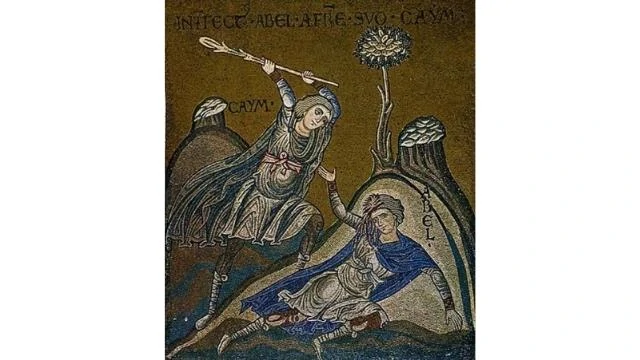
Being accused of the “sin of Cain” (depicted here in the Cathedral of Monreale, Sicily) who according to the Bible killed his brother Abel and became the first murderer in human history, is a very serious accusation for a Christian. From Twitter.
Apart from a few local Orthodox figures sold out or terrorized by the bloodthirsty hierarchs of the pseudo-republics of Donetsk and Luhansk, there is no Christian church or authority in Ukraine today that supports Putin.
If the aggression aimed at further dividing the Christians of Ukraine into anti-Russians and pro-Russians, it has on the contrary united them in the execration of the Kremlin’s “Cain.”
[End, article by Massimo Introvigne]
Here is an Associated Press report on the March 6 “terrible sermon” of Patriarch Kirill. This report has appeared in many publications and websites throughout the West, and summarizes the criticism of Kirill’s sermon.
***
Moscow patriarch stokes Orthodox tensions with war remarks (link)
Kirill on Sunday depicted the war in spiritual terms.
March 8, 2022
By Peter Smith, Associated Press
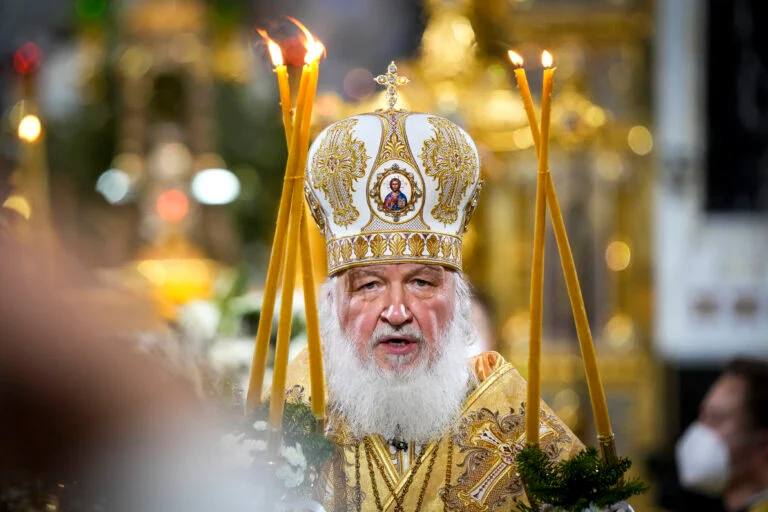
Russian Orthodox Patriarch Kirill delivers the Christmas Liturgy in the Christ the Savior Cathedral in Moscow, January 6, 2022. (AP Photo/Alexander Zemlianichenko)
Russian Orthodox Patriarch Kirill, leader of Russia’s dominant religious group, has sent his strongest signal yet justifying his country’s invasion of Ukraine — describing the conflict as part of a struggle against sin and pressure from liberal foreigners to hold “gay parades” as the price of admission to their ranks.
Kirill, a longtime ally of Russian President Vladimir Putin, had already refrained from criticizing the Russian invasion – alienating many in the Ukrainian Orthodox churches who had previously stayed loyal to the Moscow patriarch during a schism in their country.
Several of these former loyalists are now snubbing Kirill in their public prayers, with some demanding independence from the Moscow church even as their country’s political independence is imperiled.
Kirill, in a sermon delivered Sunday before the start of Orthodox Lent, echoed Putin’s unfounded claims that Ukraine was engaged in the “extermination” of Russian loyalists in Donbas, the breakaway eastern region of Ukraine held since 2014 by two Russian-backed separatist groups.
Kirill focused virtually all of his talk about the war on Donbas — with no mention of Russia’s widespread invasion and its bombardment of civilian targets.
Kirill on Sunday depicted the war in spiritual terms.
“We have entered into a struggle that has not a physical, but a metaphysical significance,” he said.
He contended that some of the Donbas separatists were suffering for their “fundamental rejection of the so-called values that are offered today by those who claim world power.”
He claimed that this unnamed world power is posing a “test for the loyalty” of countries by demanding they hold gay pride parades to join a global club of nations with its own ideas of freedom and “excess consumption.”
But many Orthodox Christians in Ukraine have been appalled by Kirill’s stance on the Ukraine war.
The Moscow patriarch has for centuries claimed the ultimate loyalty of the Ukrainian Orthodox Church, even though the latter retained ample autonomy.
And many priests, monks and faithful had remained loyal to Kirill even with the formation of a more nationalist, Kyiv-based Orthodox Church of Ukraine, in 2018 and 2019.
The war is shattering that loyalty for some, however.
Numerous bishops in the Ukrainian Orthodox Church have authorized their priests not to commemorate Patriarch Kirill in their prayers during public worship services — a symbolically important statement in Orthodox tradition, which puts a premium on the faithful being in communion with their divinely ordained hierarchy.
Since the war began, as many as 15 dioceses of the Orthodox Church of Ukraine had authorized the omission of the patriarch’s name, according to the Union of Orthodox Journalists, a news site with generally positive news about the Moscow-leaning church.
The Rev. Mykola Danilevich, who has served as a spokesman for the Ukrainian Orthodox Church, confirmed on his Telegram account that “many of our priests have stopped commemorating the Moscow Patriarch for worship services.”
“And the reason is obvious,” Danilech wrote March 1, before Kirill’s most recent Sunday sermon. “The treacherous open invasion of Ukraine is a huge mistake of Russia. … People did not hear from the patriarch a clear assessment of this war and his call to stop this madness.”
Clergy in at least two dioceses — Lviv and Volodymyr-Volynskaare — are calling for independence from the Moscow church, according to their Facebook pages.
Many Ukrainian Orthodox are shocked that Kirill “condemned evil in the broadest terms but said nothing about the war let alone its initiation by Russia,” said Catherine Wanner, a Pennsylvania State University professor of history, anthropology and religious studies.
“In the violence and the deaths and the terror that is engulfing Ukraine right now, I don’t think anyone is worried about specific jurisdictions,” said Wanner, whose studies focus on the region. “But this will be a sea change.”
The Rev. Cyril Hovorun, professor of ecclesiology, international relations and ecumenism at University College Stockholm, said Kirill’s latest comments show him to be in a “golden cage.”
He said Kirill helped “supply the ideology” that Putin has used to justify Russian hegemony over the region, and in return the church has received strong government support.
“Even if he (Kirill) understands what is going on in Ukraine with the war, even if he wants to speak up and name things by their proper name, he can’t,” said Hovorun, author of several books about Orthodoxy in Ukraine and beyond. “He is a completely unfree figure that needs to follow faithfully the official narrative.”
Archbishop Daniel of the Ukrainian Orthodox Church of the USA said Patriarch Kirill’s latest comments were “incomprehensible.”
“Regardless of our beliefs and regardless of our stance on social and moral issues, you cannot use that as a propaganda tool to justify the Russian invasion and the slaughter of innocent people,” he said.
Many Orthodox and other religious conservatives, including in Ukraine, share Kirill’s stance on sexual ethics, said the Rev. John Burgess, a professor at Pittsburgh Theological Seminary and author of “Holy Rus’: The Rebirth of Orthodoxy in the New Russia.”
“But Ukrainians and Ukrainian Orthodox are under attack, are suffering, are afraid for the future for the nation,” Burgess said. “None of that is reflected in the sermon. If rockets are falling Kharkiv and Kyiv, and the patriarch starts talking about gay parades, it seems like something is odd here.”
Burgess said the practice of refusing to commemorate a patriarch in prayer has precedents.
Some Russian Orthodox priests suffered persecution under communist rule for refusing commemorate a patriarch they deemed too compromising with the Bolshevik government.
The clerics currently distancing themselves from Kirill could be “risking their very future,” Burgess said.
“If President Putin and the Russians truly prevail in Ukraine, what will happen to these bishops?” he said. “They’ll be removed, or they’ll have to go into the underground.”
[End, Associated Press report on Kirill’s March 6 sermon]
Here is a background article on the role of the Russian Orthodox church in Russia over the centuries, by American Prof. Scott Kenworthy of Miami University.
***
Why is Russia’s church backing Putin’s war? Church-state history gives a clue (link)
By Scott Kenworthy, Professor of Comparative Religion, Miami University
March 21, 2022
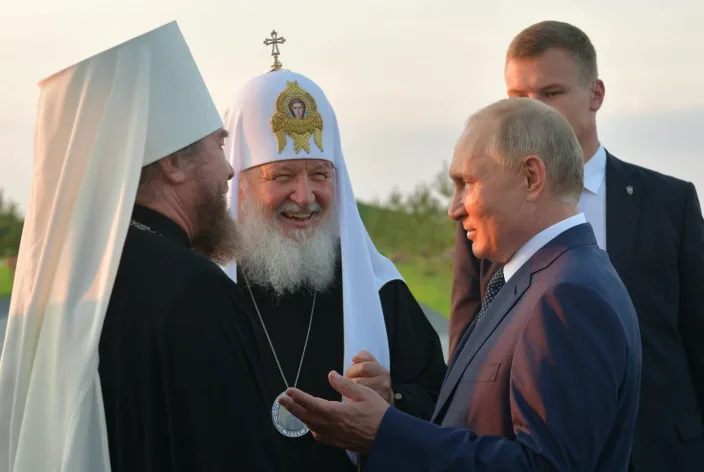
Vladimir Putin speaks to Russian Orthodox Church Patriarch Kirill(center) in Samolva, Russia, on Sept. 11, 2021. Alexei Druzhinin/Pool Photo via AP
Since Russia’s invasion of Ukraine, the leader of the Russian Orthodox Church has defended Russia’s actions and blamed the conflict on the West.
Patriarch Kirill’s support for the invasion of a country where millions of people belong to his own church has led critics to conclude that Orthodox leadership has become little more than an arm of the state – and that this is the role it usually plays.
The reality is much more complicated.
The relationship between Russian church and state has undergone profound historical transformations, not least in the past century – a focus of my work as a scholar of Eastern Orthodoxy.
The church’s current support for the Kremlin is not inevitable or predestined, but a deliberate decision that needs to be understood.
Soviet shifts
For centuries, leaders in Byzantium and Russia prized the idea of church and state working harmoniously together in “symphony” – unlike their more competitive relationships in some Western countries.
In the early 1700s, however, Czar Peter the Great instituted reforms for greater control of the church – part of his attempts to make Russia more like Protestant Europe.
Churchmen grew to resent the state’s interference. They did not defend the monarchy in its final hour during the February Revolution of 1917, hoping it would lead to a “free church in a free state.”
The Bolsheviks who seized power, however, embraced a militant atheism that sought to secularize society completely. They regarded the church as a threat because of its ties to the old regime. Attacks on the church proceeded from legal measures like confiscating property to executing clergy suspected of supporting the counterrevolution.
Patriarch Tikhon, head of the Church during the Revolution, criticized Bolshevik assaults on the Church, but his successor, Metropolitan Bishop Sergy, made a declaration of loyalty to the Soviet Union in 1927.
Persecution of religion only intensified, however, with repression reaching a peak during the Great Terror of 1937-1938, when tens of thousands of clergy and ordinary believers were simply executed or sent to the Gulag.
By the end of the 1930s, the Russian Orthodox Church had nearly been destroyed.
The Nazi invasion brought a dramatic reversal. Josef Stalin needed popular support to defeat Germany and allowed churches to reopen. But his successor, Nikita Khrushchev, reinvigorated the anti-religious campaign at the end of the 1950s, and for the rest of the Soviet period, the church was tightly controlled and marginalized.
Kirill’s campaigns
The dissolution of the Soviet Union brought yet another complete reversal.
The church was suddenly free, yet facing enormous challenges after decades of suppression.
With the collapse of Soviet ideology, Russian society seemed set adrift.
Church leaders sought to reclaim it, but faced stiff competition from new forces, especially Western consumer culture and American evangelical missionaries.
[To read the rest of this piece, click here.]
Here is an article from two weeks ago on how all of this affects the efforts of Pope Francis and the Catholic Church to carry on a religious dialogue with the Russian Orthodox.
***
With war in Ukraine, Pope Francis’ yearslong outreach to Kirill appears to be in ruins (link)
For years popes have hoped to meet the Russian Patriarch in Moscow, but the war in Ukraine has set back the clock on overcoming the Christian divide between East and West.
March 10, 2022
By Claire Giangravé, Religious News Service
VATICAN CITY (RNS) — High-ranking Vatican officials criticized Patriarch Kirill of Moscow this week for his failure to push for peace in Ukraine, nearly ensuring that among the casualties of Russia’s invasion may be Pope Francis’ years-long campaign to strengthen the Catholic Church’s bonds with Russian Orthodox Christians.
Only a month ago, the Vatican still eagerly anticipated a possible meeting between Patriarch Kirill of Moscow and Pope Francis this summer, building on a historic 2016 meeting in Havana, where they signed a 30-point joint declaration calling their churches “to prudence, social solidarity and to action aimed at the construction of peace.”
That document cast Europe’s two dominant Christian churches as peacemakers in the region and specifically in Ukraine. The pope promised to promote harmony between the Orthodox communities in Ukraine, which had already begun to fracture over Russian political meddling.
Expectations have increased ever since that the pope might crown ecumenical efforts begun by his predecessors by becoming the first pontiff to visit Moscow, or that the two leaders would meet in the southern Italian town of Bari, which increasingly under Francis has become a hub of Catholic ecumenical efforts. In 2003, Russian President Vladimir Putin gave the town a statue of St. Nicholas, beloved by Catholics and Orthodox, as a sign of reconciliation.
Before becoming patriarch, Kirill visited Rome as chair of the Russian church’s department for external church relations and was a familiar face to many at the Vatican. As patriarch, he joined Francis in his push for further cooperation, focusing on charitable work and the promotion of religious freedom rather than attempting to reconcile complex theological issues.
But with Russia’s entry into Ukraine Feb. 24, the possibility of a meeting between Francis and Kirill began to fade. Francis abruptly canceled his appearance at a meeting with Mediterranean bishops and politicians to promote peace, citing knee pains, but days later he left the Vatican to meet with the Russian ambassador to the Holy See.
The pope did not openly condemn Russia as the conflict began, possibly attempting to retain a diplomatic disinterest in hopes of serving as an intermediary.
But at a prayer service on Sunday (March 6), he pushed back against Russian claims that the invasion of Ukraine was a minimal “special military operation.”
In a sermon the same day, Kirill sided heavily with Putin, providing a spiritual platform for the aggression in Ukraine and condemning Western influence, particularly what he alleged was an LGBTQ agenda.
“We have entered into a struggle that has not a physical, but a metaphysical significance,” Kirill said, accusing Western powers of promoting values contrary to Christian teaching.
Francis’ No. 2 at the Vatican, Cardinal Pietro Parolin, spoke candidly about the repercussion of Kirill’s remarks.
“Kirill’s words do not favor or promote an agreement. Instead, they risk heightening spirits toward an escalation and not solve the crisis peacefully,” Parolin, who heads the Vatican Secretariat of State, said at an event in Rome on Wednesday. [March 9, 2022]
Asked about the possibility of a meeting between Francis and Kirill, the cardinal said that “the situation is complicated by the tensions that exist between the churches, so at the moment there hasn’t been the opportunity” to plan a meeting.
Parolin spoke to Russian Foreign Minister Sergey Lavrov earlier this week but said he “was given no reassurance” by Moscow concerning the protection of civilians in Ukraine and seemed to express doubts about the possibility of a peaceful solution to the conflict.
On Tuesday, Cardinal Jean-Claude Hollerich, president of the European Catholic bishops’ official delegation to the European Union, appealed to Kirill directly in an open letter asking him to “show goodwill for seeking a diplomatic solution to the conflict, based on dialogue, common sense and respect for international law.”
Hollerich cited the Havana declaration and urged Kirill in the letter to “not let those powerful words go in vain.”
Meanwhile, Metropolitan Archbishop Hilarion, who now heads the department for external church relations for the Russian church and who played a crucial role in Francis’ and Kirill’s meeting in Havana, has remained silent on the Ukrainian and Russian conflict. His refusal to condemn Russia’s actions cost him his teaching position at the University of Freiburg, which suspended him earlier this week.
With ecumenical and diplomatic channels seemingly exhausted, Francis sent two Vatican officials, Cardinal Michael Czerny and Cardinal Konrad Krajewski, to the border with Ukraine as representatives of the pope with the mission to help immigrants, promote peace and rekindle dialogue with the local churches.
Krajewski, the papal almoner, spoke with the head of the autocephalus church of Ukraine, Epiphanius, online on Tuesday and expressed the closeness of the Vatican and Pope Francis with the suffering people of Ukraine.
The Vatican’s outreach to Moscow has been complicated by its warming relations with Ecumenical Patriarch Bartholomew I, archbishop of Constantinople, who is considered the “first among equals” of the Eastern Orthodox patriarchs and who has visited the Vatican repeatedly and attended Catholic events. In 2019, Bartholomew recognized the Orthodox Church of Ukraine as an independent entity, formalizing its split from Moscow and creating a breach with Kirill.
According to a Pew Research Center Survey conducted in 2016, roughly 46% of Orthodox Ukrainians adhere to the autocephalous church, while 17% look to Kirill as their spiritual leader.
Aside from his difficulties with Rome, Kirill is facing increased backlash from his own clergy for his support of Putin’s war. On March 3, hundreds of Russian Orthodox priests declared they will no longer commemorate the patriarch during services. Some Orthodox bishops in Europe have also called for Kirill to speak up against the war.
Before the conflict in Ukraine erupted into war, some at the Vatican hoped it could calm the interreligious tensions in the country through the mediation of the Greek Catholic Church, which is loyal to Rome.
On Thursday, Archbishop Sviatoslav Shevchuk urged Ukrainians to accept forced migrants fleeing combat in eastern Ukraine: “Disregard the language they speak, the church they go to, which traditions they have. Open to them your hearts, your homes, embrace them in the name of God!”
It’s a message that Francis might have wished he and Kirill could have once issued together.
[End, article by Claire Giangravé, Religious News Service]
Here are some brief remarks from March 21, 2022, by Metropolitan Hilarion Alfeyev, head of the External Relations Department of thje Russian Orthodox Church (a post that Patriarch Kirill held before he was elected patriarch).
***
Metropolitan Hilarion: Example of St. Elizabeth Feodorovna inspires not only Orthodox, but also many non-Orthodox Christians (link)
March 21, 2022
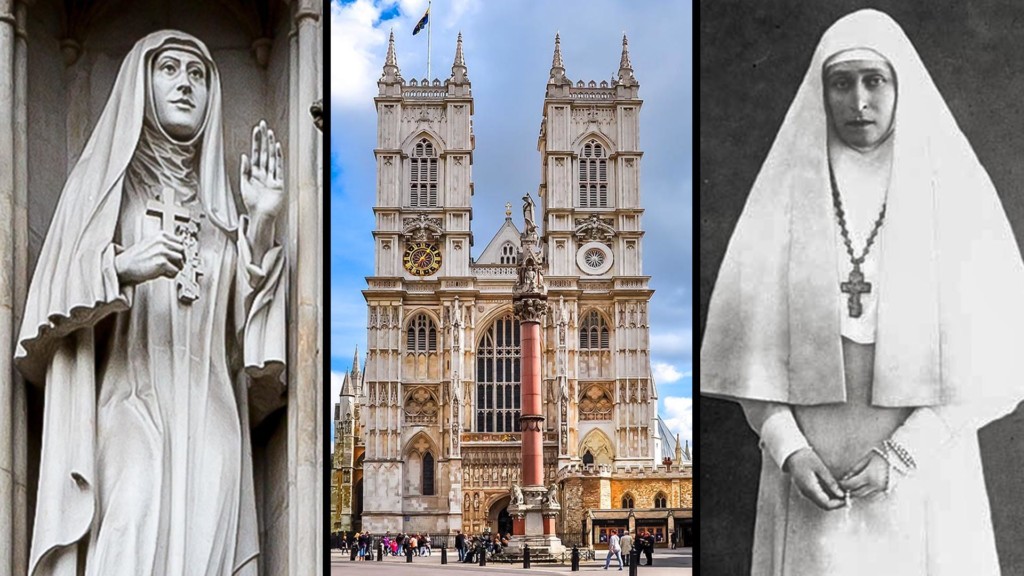
An example of life of the Grand Duchess Elizabeth Feodorovna, a German by birth and English by education, “inspires not only Orthodox, but also many non-Orthodox Christians,” Metropolitan Hilarion pointed out at “The Church and the World” TV program.
At Westminster Abbey, the main Anglican church in London and the site of coronations and royal weddings, there are ten statues of the saints above the great western door representing different nations and Churches. When an issue of installing statues to the new martyrs was being decided, the leadership of the Anglican Church asked the Russian Orthodox Church to propose an Orthodox saint. “We have proposed Elizabeth Feodorovna, and our proposal was accepted with gratitude. Now, as you come to Westminster Abbey in London, you can see her statue right on the western wall,” said the DECR chairman.
DECR Communication Service
Illustration: Russia Beyond





Facebook Comments